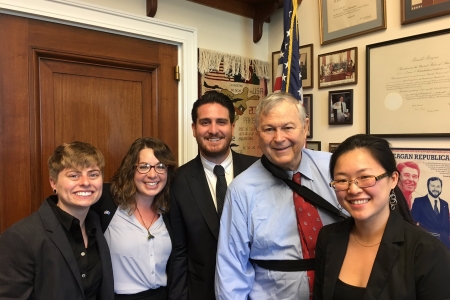Climate Action Fellow Goes to D.C.
 May 17, 2017 - Civil and environmental engineering graduate student Kimberly Duong traveled to Washington D.C. in late April as a fellow in UC Irvine’s Climate Action Training Program. Under the direction of Steven Allison, associate professor of ecology and evolutionary biology, the one-year training program is designed for graduate students who plan to pursue careers that address climate issues.
May 17, 2017 - Civil and environmental engineering graduate student Kimberly Duong traveled to Washington D.C. in late April as a fellow in UC Irvine’s Climate Action Training Program. Under the direction of Steven Allison, associate professor of ecology and evolutionary biology, the one-year training program is designed for graduate students who plan to pursue careers that address climate issues.
Duong, a fourth-year doctoral student working with Professor Stanley Grant on urban drought and water conservation, made the journey East with three other UCI graduate students. Supported by the UCI Sustainability Initiative, the interdisciplinary cohort trained in quantitative, communication and professional skills in preparation for careers that address climate issues.
On Capitol Hill, the Anteaters met with Congressional staff from 10 different Southern Californian districts as well as from Sen. Kamala Harris's office.
“We discussed our graduate research, such as drought, how it pertains to climate change, and ways that we hope to see representatives engage in policy solutions in order to mitigate local impacts in their districts,” said Duong
She thought the meetings were extremely productive and engaging, and she was able to share information about her research with a wide variety of audiences.
“I learned more about science policy (specifically climate change policy) in two days than I had ever learned before,” said Duong.” My key takeaway was that the personal values of policymakers and their constituents are essential in crafting policy. This is very different from science as a discipline, which is predicated on being impartial and unbiased. Before this trip, I simply thought that science policy involved scientists informing policymakers of the most current research findings. I now see that there are many more layers of complexity at the intersections of these vastly different fields.”
The students also discussed climate change policy with representatives from the American Meteorological Society (AMS), American Association for the Advancement of Science (AAAS), and American University.
– Lori Brandt
